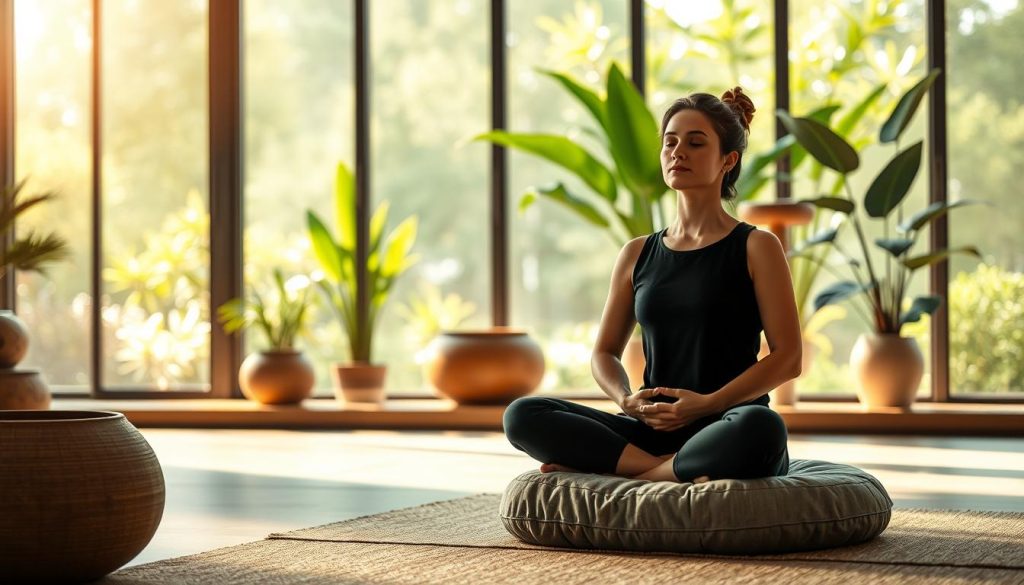In today’s fast world, our biological clock is often out of sync. The demands of modern life and tech advancements cause stress and disrupt our sleep patterns. This can lead to health problems.
This article explores how our internal clocks, or circadian rhythm, are affected by today’s lifestyle. We’ll look at how these disruptions harm our health. It’s important to understand this to fight stress and live healthier.
The Impact of Modern Life on Our Biological Clock
In today’s fast world, our natural sleep cycles face big challenges. Digital devices and too much screen time mess with our sleep. This problem is worse when we use screens right before bed.
Technology and Screen Time
Digital screens are everywhere in our lives. Smartphones, tablets, and computers give off blue light. This light stops our body from making melatonin, the sleep hormone.
So, watching screens too much in the evening messes with our sleep. It leads to problems sleeping and feeling stressed.
Work Schedules and Shift Work
Unusual work hours, like shift work, make sleep hard. Our body’s clock can’t keep up with changing work times. This causes sleep loss and more stress.
These issues don’t just hurt our sleep. They also harm our health and happiness in the long run.
The Science Behind Circadian Rhythm Disturbances
Circadian rhythms control our body’s natural cycles, matching the 24-hour day and night. They help us sleep, eat, and release hormones at the right times. These rhythms keep our body working well, thanks to environmental signals.
What is Circadian Rhythm?
The suprachiasmatic nucleus (SCN) in the brain runs our circadian rhythm. It uses light signals to keep our body clock in sync. When it works right, it helps us sleep, eat, and do other important things. But, when it’s off, it can cause stress and affect our health.
How Modern Life Disrupts Our Biological Clock
Today’s lifestyle often messes with our body’s clock. Staying up late to use screens and working odd hours can mess up our sleep. Blue light from devices, for example, can stop melatonin production, making it tough to sleep. This can make us stressed and affect how we handle stress.
Circadian Misalignment and Stress: Understanding the Connection
Circadian misalignment is a big problem for sleep. It messes with our natural sleep cycle, making us stressed. Hormones like cortisol help us wake up and relax. But when they’re off, we feel stressed and can’t sleep well.
Stress and our body’s rhythms are closely linked. High cortisol levels at the wrong time upset our balance. This makes it hard to sleep and messes with our internal clock. Studies show that our busy lives and irregular schedules play a big role in this.
Our fast-paced lives make it hard to keep a regular schedule. We often have trouble sleeping because of it. Stress makes cortisol go up, making it hard to sleep deeply. This creates a cycle of stress and bad sleep.
Knowing how circadian misalignment affects us helps us take action. We can learn to manage our sleep and stress better. By understanding the link between cortisol and sleep, we can make changes to live healthier.

- Disrupted sleep-wake cycles lead to elevated cortisol levels.
- High cortisol levels disturb sleep patterns, creating a negative feedback loop.
- Modern life’s demands often exacerbate stress-induced sleep problems.
| Factor | Impact on Circadian Rhythm | Consequences |
|---|---|---|
| Irregular Work Schedules | Disrupts natural sleep patterns | Increased cortisol levels, stress-induced sleep problems |
| Technology Use at Night | Interferes with melatonin production | Elevated cortisol levels, poorer sleep quality |
| Stressful Lifestyle | Alters hormonal balance | Chronic stress, irregular sleep patterns |
Health Consequences of Chronic Stress Due to Sleep-Wake Cycle Disruptions
Chronic stress from sleep disruptions can lead to serious health issues. It affects both physical and mental health. This can lower your quality of life and overall well-being.
Physical Health Issues
Stress from disrupted sleep can cause physical problems. It increases the risk of heart disease, obesity, and diabetes. These issues are made worse by stress and sleep rhythm problems.
Mental Health Problems
Long-term sleep loss and stress harm mental health. Depression, anxiety, and brain function problems can worsen. It’s key to understand how stress from sleep issues affects mental health.
By addressing these issues, we can improve mental well-being. This helps reduce the negative effects of stress and sleep problems.
Psychological Stress and Circadian Rhythm: A Vicious Cycle
Psychological stress and circadian rhythm problems make a bad cycle. This cycle can really hurt how well you feel overall. Stress can mess up your sleep by changing cortisol levels, making stress worse and leading to mood issues. It’s key to understand this cycle to find good ways to handle stress.
Cortisol Levels and Sleep Patterns
Cortisol, a stress hormone, goes up in the morning and goes down at night. But, too much stress can mess with this natural pattern. This can cause high cortisol levels at night, making it hard to sleep and keep a regular day-night cycle. This makes it tough to break the cycle of sleep problems.
Behavioral and Emotional Impact
Stress and sleep issues can really affect how you act and feel. You might get irritable, have mood swings, and find it hard to focus. These problems can make life less enjoyable and make it harder to manage stress. By tackling these issues together, you can find a better balance and improve your mental health.
Stress Management Strategies in a 24/7 Society
Dealing with stress in today’s fast-paced world can be tough. But, using the right strategies can really help. Adding relaxation techniques like deep breathing, muscle relaxation, and meditation to your day is key. These methods can keep stress levels down.
Good sleep habits are also vital for handling stress. This means having a regular sleep schedule, a cozy sleep space, and avoiding caffeine and big meals before bed. Getting quality sleep not only lowers stress but also boosts your health.
It’s also important to separate work from personal life in a world that never stops. Set clear times for work and play to keep a healthy balance. Having set routines for both work and relaxation helps manage stress better.

Using these strategies can greatly improve how you handle stress. By combining good sleep habits with stress-relieving techniques, you’ll see a big difference in your well-being.
The Role of Diet and Exercise in Regulating Circadian Rhythm
Eating right and staying active are key to managing our internal clock. These habits help fight the negative effects of modern life on our body’s rhythm.
Nutritional Choices
What we eat is crucial for stress relief. Foods like cherries and walnuts boost melatonin, helping us sleep better. Eating meals with complex carbs and lean proteins keeps our energy stable and sleep quality high.
Foods full of omega-3s, like salmon, are great for our brain. They help us manage our internal clock better.
Physical Activity
Adding exercise to your day is vital for better sleep. Exercise improves sleep quality and length. Morning or late afternoon workouts, like brisk walking or swimming, help set our internal clock right.
Regular exercise also releases endorphins. These chemicals help reduce stress and improve mood.
It’s important to balance diet and exercise for a healthy internal clock. Both help reduce stress, improve sleep, and boost overall health.
Importance of Creating a Sleep-Conducive Environment
Making your sleep space calm is key to better sleep. A well-made room can greatly improve your sleep quality. It helps keep your sleep habits healthy.
Optimal Sleep Conditions
To make a great sleep area, adjust the room’s temperature and cut down on noise. It’s best to keep the room cool, around 65°F, for better sleep. Also, using blackout curtains or blinds helps block out light, making it darker and signaling sleep time.
Adding soundproof materials or white noise machines can block out loud sounds. This makes the room quieter and more peaceful for sleep. These steps help make a space where you can sleep well every night.
The Role of Sleep Hygiene
Good sleep habits are essential for better sleep. Starting a calm routine, like reading or relaxing exercises, tells your brain it’s time to sleep. Also, avoiding screens for at least an hour before bed is important. Blue light from screens can mess with your natural sleep cycle.
By using these tips, you can make a sleep-friendly space. This supports better sleep quality and a regular sleep-wake cycle. It leads to better health and happiness.
Mindfulness and Relaxation Techniques to Combat Stress
In today’s fast world, mindfulness is key for stress management. Adding relaxation to your daily life can boost your mental health. It also helps fix your sleep cycle.

Mindfulness, like meditation, trains your mind to stay present. It lowers stress levels. By meditating regularly, you can feel more at peace and emotionally stable.
Deep breathing is also great for stress relief. It slows down your body’s stress response and calms you down. Doing these exercises before bed helps you sleep better and keeps your sleep cycle regular.
Yoga combines physical movement, breathing, and meditation. It’s a powerful way to relax and improve your health. Yoga not only manages stress but also helps you sleep better.
Adding mindfulness to your daily routine can greatly reduce stress. By practicing meditation, deep breathing, and yoga, you can improve your health and well-being.
| Mindfulness Practice | Benefits | How to Practice |
|---|---|---|
| Meditation | Reduces stress, improves focus | Set aside 10-15 minutes daily for mindful sitting |
| Deep Breathing | Lowers stress response, calms the mind | Practice slow, controlled breathing for 5-10 minutes |
| Yoga | Enhances physical and mental health, promotes relaxation | Combine physical postures with breath control and meditation |
The Link Between Circadian Rhythm and Mental Health
Understanding the link between our body’s clock and mental health is key. Disruptions in our sleep-wake cycle can lead to anxiety and depression. By keeping our body’s rhythm in sync, we can improve our mental health.
Studies show that regular sleep is crucial for mood and brain function. Irregular sleep worsens mood disorder symptoms, making stress harder to handle.
Practices like regular sleep times, natural light, and avoiding blue light before bed help. These steps are important for a balanced body rhythm, boosting our mental health.
Hormonal imbalances from a misaligned body clock can harm our mental state. Cortisol, the stress hormone, is tied to sleep. Imbalances can increase stress, leading to mental health problems. So, managing our sleep is vital for both physical and mental health.
Practical Tips to Mitigate Circadian Misalignment
Keeping a healthy circadian rhythm is tough in today’s fast world. But, there are simple steps to help your body’s clock match your day.
Maintaining a Consistent Sleep Schedule
It’s key to keep a regular sleep schedule for a balanced circadian rhythm. Going to bed and waking up at the same time every day helps. This makes your sleep pattern stable.
Try a calming bedtime routine. Reading, listening to soft music, or a warm bath can help you relax. Stay away from hard activities and cut down on caffeine before bed for better sleep.
Limiting Exposure to Blue Light
Blue light can mess with your sleep, as studies show. It’s found in screens and can stop melatonin production, which is important for sleep.
Try to avoid screens for at least an hour before bed. Use blue light filters or wear glasses that block it. Also, make your screen brightness lower in the evening to reduce blue light.
By sticking to a regular sleep schedule and cutting down on blue light, you can fight circadian misalignment. Making small changes in your daily life can greatly improve your health.
Future Directions in Understanding and Managing Circadian Misalignment
Our understanding of circadian misalignment is growing, leading to new ways to sync our body clocks with modern life. What does this mean for us? Researchers are exploring advanced technologies to monitor and improve our sleep. Wearable devices like Fitbit and Apple Watch track our sleep patterns in real-time.
These devices give insights into how our activities and light exposure affect our body clocks. They help us understand how to improve our sleep health. Cognitive Behavioral Therapy for Insomnia (CBT-I) apps are also getting better. They offer personalized advice to help us sleep better.
Light therapy is becoming more popular for resetting our internal clocks. It’s great for those with shift work sleep disorder or jet lag. Light boxes and smart lighting systems mimic natural daylight, improving our sleep quality.
Artificial intelligence is also being used in sleep studies. AI platforms analyze data to give us personalized advice. This is a big step forward in managing circadian misalignment. As technology and research improve, we can expect better sleep management, leading to healthier lives.

